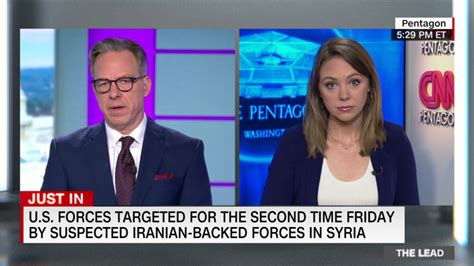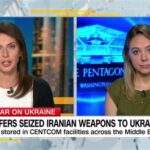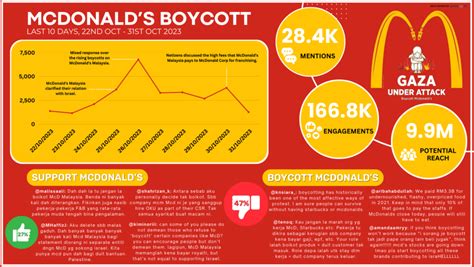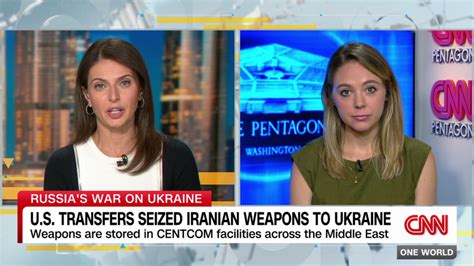
The White House has launched a blistering attack against CNN, specifically targeting journalist Natasha Bertrand, over her reporting on the United States’ response to Iranian-backed militia attacks in Iraq and Syria. The Biden administration accuses CNN of irresponsibility and amplifying Iranian propaganda, particularly concerning the extent to which the U.S. informed Iraq’s government prior to retaliatory strikes.
The White House is fiercely contesting CNN’s narrative, arguing that it accurately coordinated with the Iraqi government before conducting strikes against Kataib Hezbollah, an Iranian-backed militia group. National Security Council spokesman John Kirby, in an unusually sharp statement, accused Bertrand of “irresponsible reporting” and amplifying “false claims” that serve Iranian interests. The core of the dispute revolves around whether the Iraqi government received adequate advance notice of the U.S. strikes, with the White House asserting that it provided sufficient warning, while CNN’s reporting suggests otherwise.
The White House maintains it notified Baghdad before the strikes, allowing Iraqi forces to evacuate areas that might be affected. “We gave the Iraqis a heads up before the strikes,” a U.S. official stated. “That’s common practice.” However, CNN’s reporting indicated that Iraqi officials claimed they received only a verbal notification just minutes before the attacks commenced, leaving them little time to prepare or respond, leading to increased tensions and condemnation from Iraqi government officials.
This public spat underscores the delicate and complex dynamics of U.S.-Iraq relations and the challenges of reporting on sensitive military operations in the region. The incident also highlights the growing tensions between the White House and some media outlets, particularly regarding coverage of foreign policy and national security matters. The administration’s strong reaction signals a determination to aggressively push back against what it perceives as inaccurate or biased reporting, especially when it involves potentially damaging narratives about U.S. foreign policy objectives.
The controversy erupted following U.S. airstrikes on December 25, targeting Kataib Hezbollah in response to an attack on Erbil Air Base in northern Iraq that left several U.S. personnel injured. The U.S. has long accused Kataib Hezbollah of conducting attacks against American forces in the region, acting as a proxy for Iran. The retaliatory strikes were intended to deter further aggression and send a clear message to Tehran about the consequences of its actions.
However, the manner in which the strikes were conducted and the communication leading up to them have become a major point of contention. The Iraqi government, caught in the middle of escalating tensions between the U.S. and Iran, has expressed outrage over what it views as a violation of its sovereignty. Some Iraqi politicians have even called for a reevaluation of the U.S. military presence in the country.
The White House, through Kirby’s statement, has staunchly defended its actions and insisted that it acted responsibly and in accordance with established protocols. Kirby specifically called out Bertrand’s reporting for relying on unnamed sources and failing to provide sufficient context about the threat posed by Kataib Hezbollah.
“CNN is amplifying false claims coming from the Iranian regime,” Kirby said. “That’s just irresponsible reporting. And it’s flat wrong.” He added that the reporting “parrots false Iranian narratives.”
The Pentagon also issued a statement reiterating that the U.S. military took all necessary precautions to minimize civilian casualties and that the strikes were carefully targeted to avoid hitting civilian infrastructure.
The accusations against CNN mark a significant escalation in the White House’s approach to media relations. While previous administrations have occasionally criticized news outlets for perceived inaccuracies or bias, the direct and personal attack on Bertrand is particularly noteworthy. It suggests a more combative strategy aimed at actively shaping the narrative surrounding sensitive foreign policy issues.
The incident also raises broader questions about the role of the media in covering conflicts and the challenges of reporting on information provided by government sources. Journalists often rely on government officials for information, but they also have a responsibility to independently verify those claims and provide a balanced and accurate account of events. The White House’s reaction underscores the inherent tensions between these competing interests.
The U.S. strikes and the subsequent controversy have further complicated an already precarious situation in Iraq. The country continues to struggle with political instability, economic challenges, and the ongoing threat of terrorism. The presence of U.S. forces in Iraq remains a sensitive issue, with many Iraqis calling for their withdrawal.
The White House’s aggressive pushback against CNN’s reporting signals a desire to control the narrative and prevent the erosion of support for its foreign policy objectives. However, it also risks further alienating the media and fueling perceptions of bias and censorship. The long-term consequences of this approach remain to be seen.
The White House claims it provided advance warning through diplomatic channels. The specifics of this warning, the level of detail included, and the time frame provided are at the heart of the dispute. CNN’s reporting indicates Iraqi officials felt the warning was inadequate and came too late.
The incident unfolds against a backdrop of heightened tensions in the Middle East, with ongoing conflicts in Yemen, Syria, and elsewhere. Iran’s role in supporting various militant groups throughout the region has long been a source of concern for the U.S. and its allies. The Biden administration has sought to contain Iran’s influence while also avoiding a wider conflict.
The debate over the U.S. strikes in Iraq also reflects broader divisions within the U.S. political establishment. Some Republicans have criticized the Biden administration for being too soft on Iran, while some Democrats have called for a more cautious approach to military intervention.
The incident underscores the importance of transparency and accountability in government communications. When the White House publicly accuses a news organization of spreading false information, it has a responsibility to provide clear and convincing evidence to support its claims. Similarly, news organizations have a responsibility to carefully vet their sources and ensure the accuracy of their reporting.
The spat between the White House and CNN is unlikely to subside anytime soon. It is a reflection of the deep divisions and mistrust that characterize the relationship between the government and the media in the modern era. The long-term impact of this incident on U.S.-Iraq relations and the broader media landscape remains to be seen.
The National Security Council spokesman, John Kirby, directly stated, “They didn’t adequately represent the facts.” The White House insists it followed established protocols and provided sufficient warning, accusing CNN of amplifying misinformation that originated from Iranian sources.
The controversy comes at a crucial time, as the Biden administration seeks to balance its commitment to regional stability with its determination to deter Iranian aggression. The administration is also grappling with a range of other foreign policy challenges, including the war in Ukraine, rising tensions with China, and the ongoing threat of terrorism.
The White House’s forceful response suggests a belief that the CNN report could undermine its credibility and embolden its adversaries. The administration is clearly determined to prevent what it sees as the spread of misinformation, even if it means taking a confrontational approach to the media. The administration is trying to control the narrative by framing the incident as one of CNN irresponsibly and recklessly promoting Iranian propaganda, which could damage the United States’ position in the region.
The U.S. military has a long history of conducting operations in Iraq, dating back to the first Gulf War in 1991. The U.S. invaded Iraq in 2003, leading to the overthrow of Saddam Hussein. U.S. forces remained in Iraq for several years, battling insurgents and training Iraqi security forces. The U.S. formally withdrew its combat troops from Iraq in 2011, but a small number of U.S. troops have remained in the country to advise and assist Iraqi forces in the fight against ISIS.
The strikes against Kataib Hezbollah are just the latest in a series of incidents that have strained U.S.-Iraq relations. In recent years, there have been numerous attacks against U.S. forces in Iraq, often attributed to Iranian-backed militias. The U.S. has responded with retaliatory strikes, further escalating tensions.
The Iraqi government has repeatedly called for a de-escalation of tensions and a peaceful resolution to the conflict. However, it has struggled to balance its relationship with the U.S. and its ties to Iran. Many Iraqi politicians are wary of becoming caught in the middle of a proxy war between the two countries.
The controversy surrounding the U.S. strikes highlights the complexities of operating in a volatile region with multiple competing interests. The U.S. must balance its security concerns with its commitment to respecting the sovereignty of other nations. It must also be mindful of the potential consequences of its actions, both in terms of regional stability and its own credibility.
The White House’s decision to publicly criticize CNN is a risky move, as it could further damage its relationship with the media and fuel perceptions of bias. However, the administration clearly believes that the stakes are high and that it must aggressively push back against what it sees as inaccurate or biased reporting.
The incident serves as a reminder of the importance of critical thinking and media literacy. Consumers of news must be able to evaluate the credibility of sources and distinguish between fact and opinion. They must also be aware of the potential for bias and propaganda.
The White House’s primary aim appears to be damage control, attempting to prevent the narrative from solidifying in a way that portrays the U.S. as acting unilaterally and disrespecting Iraqi sovereignty.
The broader strategic context involves the Biden administration’s efforts to revive the Iran nuclear deal, a deal that was abandoned by the Trump administration. The strikes against Kataib Hezbollah could be seen as an attempt to deter Iran from further escalating tensions and to demonstrate U.S. resolve in the region.
The White House is clearly concerned that the CNN report could embolden Iran and its proxies, making them more likely to launch further attacks against U.S. forces. The administration wants to send a clear message that it will not tolerate such attacks and that it is prepared to use military force to defend its interests.
The controversy also raises questions about the role of unnamed sources in journalism. CNN’s report relied on unnamed Iraqi officials who claimed that they received only a verbal notification of the U.S. strikes minutes before they occurred. The White House has criticized CNN for relying on these unnamed sources and for failing to provide sufficient context about their motivations.
Journalists often rely on unnamed sources to obtain information that would otherwise be unavailable. However, the use of unnamed sources also carries risks, as it can be difficult to verify the accuracy of the information and to assess the credibility of the source.
The White House’s forceful response to CNN’s report underscores the importance of transparency and accountability in government communications. When the government publicly accuses a news organization of spreading false information, it has a responsibility to provide clear and convincing evidence to support its claims. Similarly, news organizations have a responsibility to carefully vet their sources and ensure the accuracy of their reporting.
The controversy is likely to continue to unfold in the coming days and weeks. It is a reminder of the complex and challenging relationship between the government and the media and the importance of critical thinking and media literacy.
The White House insists that it provided the Iraqi government with adequate notice to evacuate personnel and take necessary precautions. CNN’s report implies this notification was either insufficient or delivered too late to be effective.
John Kirby added that the reporting from CNN was “completely inaccurate” and that there were “multiple opportunities” for CNN to “seek clarity” on the matter before publishing the story. The White House says they reached out to CNN, but they say that the reporting was still published.
The implications of this dispute extend beyond the immediate issue of the U.S. strikes in Iraq. It speaks to the broader challenges of reporting on sensitive military operations and the difficulties of navigating the complex political landscape of the Middle East. It also highlights the importance of maintaining a healthy and independent media, capable of holding the government accountable and providing the public with accurate and reliable information.
The incident serves as a reminder that the relationship between the White House and the media is often adversarial, but it is also essential for a functioning democracy. The media plays a critical role in informing the public and holding the government accountable, while the government has a responsibility to provide accurate and transparent information.
The long-term consequences of this particular dispute remain to be seen, but it is clear that it has further strained the relationship between the White House and CNN. It is also likely to fuel further debate about the role of the media in covering foreign policy and national security matters.
The White House insists that the U.S. military took all necessary precautions to minimize civilian casualties and that the strikes were carefully targeted to avoid hitting civilian infrastructure. They also state that they followed the procedures put into place for these operations.
Ultimately, the controversy highlights the importance of clear and consistent communication between the U.S. government and the Iraqi government, as well as the need for accurate and responsible reporting on sensitive military operations. It is essential that all parties involved work together to de-escalate tensions and promote stability in the region.
The White House’s aggressive pushback against CNN’s reporting signals a desire to control the narrative and prevent the erosion of support for its foreign policy objectives. However, it also risks further alienating the media and fueling perceptions of bias and censorship.
FAQ
-
What is the central dispute between the White House and CNN? The central dispute revolves around CNN’s reporting on the U.S. strikes against Iranian-backed militia groups in Iraq and Syria, specifically concerning whether the Iraqi government received adequate advance notice. The White House claims it provided sufficient warning, while CNN’s reporting suggests Iraqi officials received only minimal notification shortly before the strikes.
-
Why is the White House so critical of CNN’s reporting? The White House accuses CNN and Natasha Bertrand of “irresponsible reporting” and amplifying “false claims” that serve Iranian interests. They believe the reporting inaccurately portrays the level of coordination with the Iraqi government and fails to adequately represent the threat posed by Kataib Hezbollah. John Kirby stated, “CNN is amplifying false claims coming from the Iranian regime,” saying that the reports “parrots false Iranian narratives.”
-
What are the implications of this controversy for U.S.-Iraq relations? The controversy has further complicated an already precarious situation in Iraq, with the Iraqi government expressing outrage over what it views as a violation of its sovereignty. Some Iraqi politicians have even called for a reevaluation of the U.S. military presence in the country. The dispute could undermine trust and cooperation between the two countries.
-
What does the White House say it did to inform the Iraqi government before the strikes? The White House maintains that it notified Baghdad through diplomatic channels before the strikes, allowing Iraqi forces to evacuate areas that might be affected. A U.S. official stated, “We gave the Iraqis a heads up before the strikes. That’s common practice.” The details of this warning, the level of detail included, and the time frame provided are at the heart of the dispute.
-
What impact could this have on the relationship between the White House and the press? The accusations against CNN mark a significant escalation in the White House’s approach to media relations. While previous administrations have occasionally criticized news outlets for perceived inaccuracies or bias, the direct and personal attack on Bertrand is particularly noteworthy. It suggests a more combative strategy aimed at actively shaping the narrative surrounding sensitive foreign policy issues and potentially damaging the relationship between the press and the White House.









